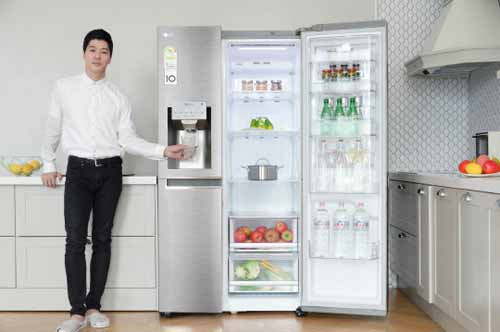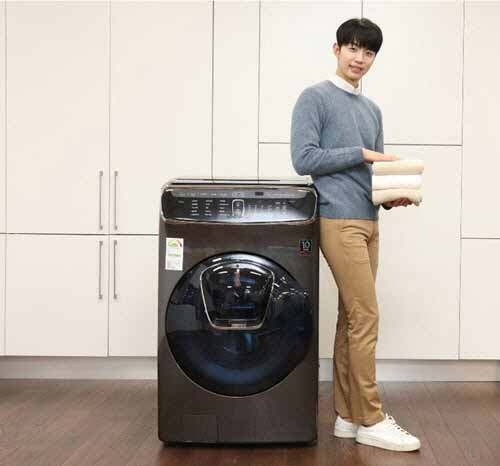`AI home appliances` in competition… Medium companies to challenge SamsungㆍLG leadership
Kim Eun | silverkim@ | 2018-04-06 10:00:57

LG Electronics, on April 5, introduced the 'LG Dios' side-by-side refrigerator in 2018, which applied an ice water purifier. Photo by LG Electronics

Samsung Electronics introduces a new product 'Samsung Flex Wash' with 'Bixbee', an artificial intelligent speech recognition platform. Photo by Samsung Electronics
LG Electronics, on April 5, released three dios refrigerators in 2018 to enhance artificial intelligence. The user learns the pattern of using the refrigerator, the temperature and humidity of the place where the product is installed, etc. in real time. By analyzing the number of times the door is opened and the time it takes, the user will operate in a power saving mode at a time when the door is almost open. In the summer when the temperature and humidity are high, the sterilization function is set to `power mode` so that the food is not easily damaged. Prices (including VAT) are between 1.7 million and KRW 3.30 million.
Meanwhile, LG Electronics is introducing `Deep Thinking`, an IoT platform focused on openness. Google, Amazon, Naver and other AI partners, and recently released AI TV All-Red TV Thumbs and Whisen Thinking Air Conditioners with Google`s Google platform. LG Electronics expects sales of products containing AI to increase by 20% from the previous year, from the total sales portion this year.
Samsung Electronics, on the other hand, launched a washing machine this month with its own artificial intelligence platform `Bixbee`. This product features AI speech recognition dialogue to recognize the appropriate washing method according to the cloth or recognize it by dialect. Previously, Bixby was applied to refrigerators and air conditioners, and this year it is also increasing its product lineup by applying Bixby to new QLED TVs. Samsung Electronics plans to apply smart functions including AI voice recognition to all home appliances by 2020.
SK Magic also launched a series of air cleaners, electric ranges, and other products that incorporate AI and Internet functions.
Medium-sized companies, which have difficulty in investing capital like large corporations due to the burden of development costs, are using artificial intelligent speakers of telecommunication companies rather than installing AI itself. The carrier air conditioner also decided to support SK Telecom AI speaker `Who` `from this year` Aero Jet 18th `new product. As the development of AI technology becomes faster, the level of intelligence of home appliances will become higher and the price of products will also be lowered due to the popularization of AI appliances.
According to the Korea International Trade Association, the Korean AI industry is expected to grow at a CAGR of 19.7% from KRW 6.4 trillion last year to KRW 11.1 trillion by 2020.
By Kim Eun silverkim@
